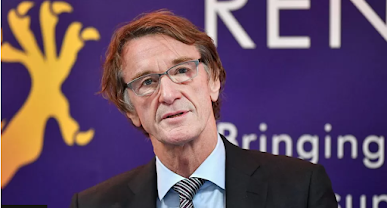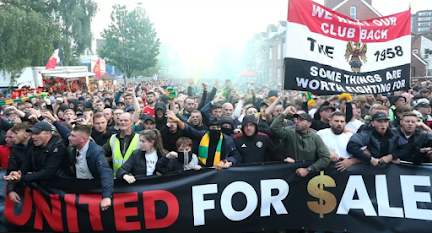Manchester United, one of the world's biggest football clubs, is potentially up for sale with its owners considering their options.
The Glazer family, who bought the club in 2005 for £790m, say they are exploring "strategic alternatives".
It is thought they could sell it for £4bn-£4.5bn, though
some have suggested higher sums.
The move has been welcomed by fans, who have protested
for years against the American family's ownership. [DOWNLOAD THE BEST VIDEO EDITING SOFTWARE FOR FREE]
So who might be interested in buying the club?
One of the UK's richest men, Sir Jim Ratcliffe is one of a
few names to regularly be mentioned when it comes to a potential takeover of
Manchester United.
He first declared his interest in buying the club in
August, with a spokesman for him saying: "If the club is for sale,
Jim is definitely a potential buyer."
Sir Jim is a fan of the Red Devils, which will appeal to
supporters disenfranchised by the current owners' perceived lack of investment
in the club's facilities and team.
He made his fortune through buying up and turning around
cast-off parts of other businesses. From operations once owned by the likes of
oil giant BP, Sir Jim created a company - Ineos - whose chemicals and raw
materials go into nearly everything we touch every day.
Who is Jim Ratcliffe? [GROW YOUR ONLINE BUSINESS WITH THIS AMAZING PLATFORM]
The Lancashire-born businessman would be the fans' choice,
according to football finance expert and author Kieran Maguire. [THE LEADING VIDEO CONFERENCING AND WEBINAR APP]
"He has openly said he had discussions with the Glazers
earlier this summer," he says.
But Sir Jim has not commented or signaled his intentions
following the Glazers' announcement on Tuesday and Mr. Maguire says the Ineos
founder is "less likely" to pay over the odds for the club.
Lord O'Neill led the so-called Red Knights group of
investors that tried to buy the club back in 2010.
A United fan like Sir Jim Ratcliffe, Lord O'Neill told the
BBC that whoever owns the club "needs to understand what they're taking
on" and have "some proper purpose and culture behind what they're
trying to do".
Asked on the BBC's Today program whether he just needed to
raise £4bn to buy the club, Lord O'Neill didn't rule out tabling a bid.
"I'm not sure if it will necessarily be that much
(£4bn) but let's see," he said.
Lord O'Neill was a boss at investment bank Goldman Sachs
from 1995 to 2013, spending most of his time there as chief economist.
US owners and companies buying stakes in Premier League
clubs has been a big talking point in the game and what the future holds for
it.
According to research by consultancy Deloitte, the US has
been the source of more than two-thirds of investments in Europe's biggest
leagues over the past five years, with an "influx of private equity
interest". [CHECK OUT THESE PROFESSIONAL SKILLS THAT YOU CAN STUDY FOR FREE]
Steve Gans, a sports lawyer and partner at the Boston firm
Prince Lobel, who also previously worked with Liverpool's owners Fenway Sports
Group, says a lot of American private equity firms want to invest in
international football because "if they own other American sports that are
uniquely American, they feel like they have saturated the market".
"They see an unlimited market worldwide [with
football]. The Premier League sells its TV [rights], it's 205 territories and
countries around the world, that's an astounding market and these owners
believe they can reach something that they can't reach with traditional
American sports," he adds.
Mr Gans also says firms believe they have the marketing
techniques to "make those clubs grow digitally and otherwise to a
stratosphere that they are not at now".
But more American investment might not be welcomed at Old
Trafford, with club legend and commentator Gary Neville, saying in the summer
that rumors of a part sale to US investment fund Apollo would be
"totally unacceptable".
Buyers from the Middle East
Manchester United's rivals Manchester City are owned by the
Abu Dhabi United Group, while Newcastle United have recently been taken over by
a consortium led by Saudi Arabia's Public Investment Fund.
Paris Saint-Germain are owned by Qatar Sports Investments
and there may be other Gulf nations interested in Manchester United.
Football finance expert Mr Maguire told the BBC there were
countries in the region that have "access to funds that could be
used" to meet the Glazers' high price.
However, as widely reported, such deals can lead to moral
and ethical dilemmas for supporters.
[CHECK OUT THESE PROFESSIONAL SKILLS THAT YOU CAN STUDY FOR FREE]
SOURCE:BBCNEWS







0 comments:
Post a Comment